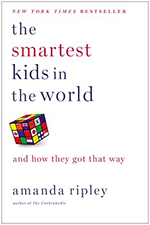
The Smartest Kids in the World: And How They Got That Way by Amanda Ripley, Published by Simon & Schuster, 2013. 320 pp.
Journalist Amanda Ripley admits she avoided writing about education because she deemed most education related writing to be soft and lacking in hard evidence. During an assignment to write about then Washington D. C. public school chancellor, Michelle Rhee, Amanda became intrigued with the mysteries of education. More specifically she became curious as to why some students learned more than others. More and more articles and research followed for Amanda. She combed through data, visited schools, interviewed students, parents, teachers and administrators. Although she could find an occasional diamond in the rough, Amanda was coming to the conclusion that outside of being lucky student performance seemed to be linked to money and privilege. But then she had an aha moment!
During her research Amanda had discovered that test scores for students in different countries would rise and fall over time and in some cases quite dramatically. Realizing that typical indicators such as national child poverty level were not necessarily an indicator of poor student performance she set out to find out what separates the highest achieving nations from others and more specifically the United States.
It may seem as if the author is mesmerized by data but Amanda uses "field agents" to help tell the story of differing educational cultures from around the world. The primary field agents are three American exchange students. She follows one agent to Finland, one to Poland, and one to Korea each having a different background and purpose for studying abroad. Amanda's ability to weave the stories of these field agents with the massive amounts of data available on student performance makes this book compelling and difficult to put down.
Amanda concludes that quality of education is not about technology, class size, or dollars per pupil but instead is basically about rigor. Not just rigor related to making students work harder or longer as in the Korean system which has its own set of flaws. Instead there must be rigor at every level of an educational system. The countries that are consistently high performers have a culture where education is important for everyone not just the privileged or the lucky. From only accepting the best applicants into colleges to emphasizing academics over athletics to expecting more from students this book provides the foundations on which to build a system that educates the smartest kids in the world.
Reviewed by Andy Martin
